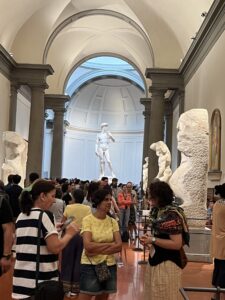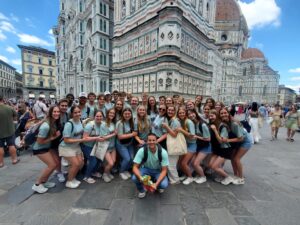I spent most of my time on the CIBS Summer 2024 Italy trip in the beautiful city of Florence. Florence is a gorgeous and ancient city best known for its contributions to the arts. Some of its most significant artistic pieces are the David, the art in the Ufizzi Gallery, and the Duomo/Florence Cathedral.
One thing I found very interesting about Florence was how heavily affected it was by World War II. Many tours mentioned how many areas of the city were destroyed or significantly damaged by the war and have since been rebuilt. I realized that while the war drastically impacted the United States, it was much more present and detrimental for those who lived in Europe.
Italy, and Europe in general, have a different definition of recent than we do, which makes World War II even more impactful for them. For example, the US is less than 300 years old, while Italy and many other parts of Europe have over 2000 years of history. World War II is still considered very recent for them due to their view of time, and their awareness of it is also heightened by the marks of the war they still see in their cities. In the US, it is easier to forget that World War II happened because we do not see its lasting impact on our country visibly through damaged structures and so on.
This helped me understand that globally, most countries have this view of time. The US is an exception because we are still a very new country from history’s perspective. This made me realize that whenever I am interacting with people from other countries in the future, I need to remember that they have a much wider view of things from their vast history. Taking into account what I have learned here, I realized I, too, should try to have a wider view of things, especially when leading a team.



